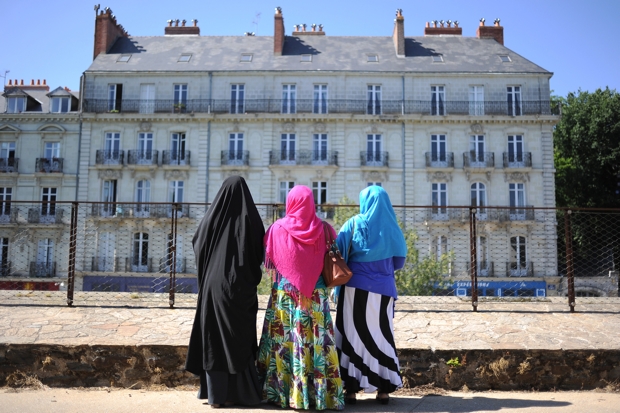France is to institute something called a National Secularity Day, which will happen on 9th December every year, when French schools will remind pupils how to sing the national anthem, what the tricolor stands for and generally celebrate the values of the Republic. Odd, isn’t it, that this should sound so much like the reflexive, everyday practice in the United States, where flag veneration and the separation of church and state are hardwired into the consciousness of US children, without impinging at all on the extent of religious observance?
Every French school will have to go through this Secularism observance day but it’s painfully apparent which community it’s directed at: France’s nearly 5 million Muslim community, amounting to, on paper, some 7.5 per cent of the population. Yet the Republic’s stubborn insistence that it is blind to the origins and religion of its citizens has meant that it’s illegal to collect data based on ethnic and religious background. But you don’t need to have stats about segregation, do you, if you’re a normal sentient individual who happens to stray into the Paris suburbs populated chiefly by the Muslim community? If you do it’s rather baffling the stir the French prime minister, Manuel Valls, caused by stating the obvious, that the failure to integrate large north African populations had led to a kind of ‘social and ethnic apartheid’. Add to those adjectives, ‘religious’ and you’re pretty well there.
Which isn’t to say that many French Muslims aren’t secularised – like the red hot Rachida Dati, the former Justice Minister, who came from a Muslim family of twelve, with a Moroccan father and Algerian mother. Interestingly, though, she attended Catholic schools. You can cite umpteen French Muslims in public life like her, only less pretty, but you’re still left with the uncomfortable reality that she’s not and they’re not, representative of the ghettos, just of themselves.
In those suburbs there was an interesting reluctance on the part of some schools and their pupils to participate in the universal Je Suis Charlie solidarity movement, and not just on the grounds of its pointless mawkishness. Like the Kouachi brothers who carried out the murders, many pupils are the French children of Algerian immigrant parents; or like Amedy Coulibaly, who murdered Jews in a kosher supermarket, from Mali. It’s quite possible, you know, that quite a few pupils from those schools will give the bird to National Secularism Day. This celebration of secularism – the chief target of which, a little over a century ago, was the Catholic Church – may demonstrate, not the exuberant vitality of Republican values transcending every other identity, but the extent to which they are not simply not shared.







Comments